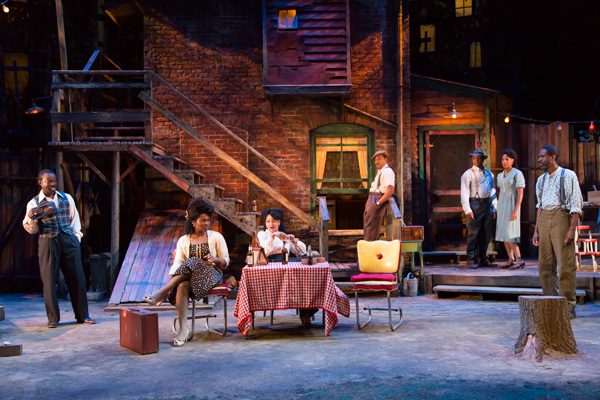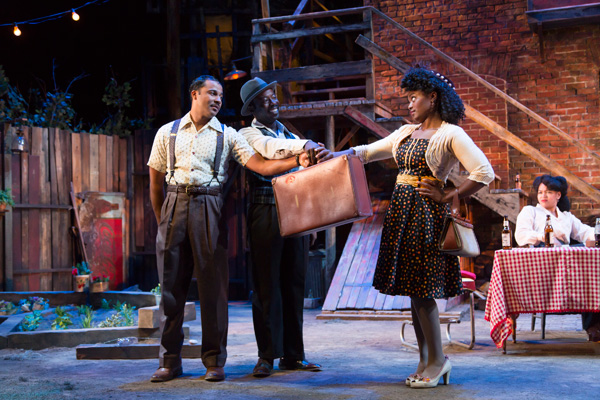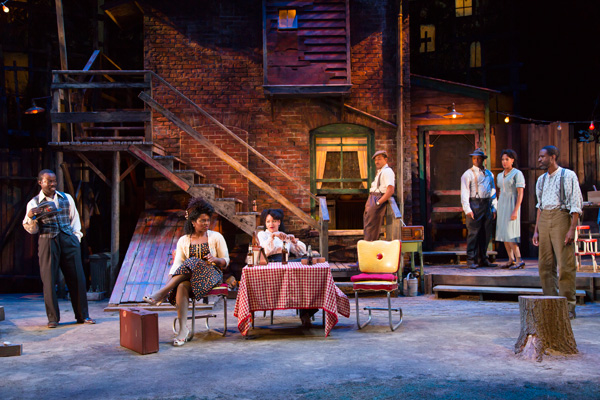
As a longtime fan of playwright August Wilson, the prospect of seeing any of his work—this one slipped passed me during Broadway (1996) and off-Broadway (2006) runs—was eagerly anticipated. The production of Seven Guitars mounted at Two River Theater in Red Bank for a three-week run, did not disappoint. In the hands of first-time director and Irvington resident Brandon J. Dirden, the performance poignantly captures the joys and sorrows that are the signatures of Wilson’s work.
Seven Guitars is the 1940s installment in Wilson’s 10-play series depicting African-American life in the Hills district of Pittsburgh during each decade of the 20th century.
Wilson’s tight, dialogue-packed stories require sharp attention as monologues and conversation sweep through at a lightning clip. Dirden—who made his professional acting debut in Wilson’s Joe Turner’s Come and Gone in 1990, and appeared in Wilson’s Jitney at Two River Theater in 2011/12—clearly hears the lyricism of Wilson’s words. While the whip-smart dialogue builds dramatic tension, the plot’s heavy themes (life, death, love, oppression, hope) are balanced by lighter moments, and music readily lifts the mood in this tale of a blues musician with great aspirations and many challenges.
Dirden’s Broadway credits include a role in Clybourne Park (2010) playing opposite his wife, Crystal Dickinson (She appears in Seven Guitars as Louise), and All the Way (2014), in which he starred as Martin Luther King Jr.
Seven Guitars runs through October 4 at Two River Theater, 732-345-1400 or tworivertheater.org.

Jason Dirden, Charlie Hudson III, Brittany Bellizeare and Crystal Dickinson. Photo by T. Charles Erickson






I just want to second my colleague Deborah’s praise for this marvelous production, which bursts with the vitality of blues musically and emotionally. There is the music of Wilson’s language; the electric blues of the lead character’s hit record; and the music the characters make onstage. Playing instruments or singing, it ranges from teasing and sexy to affirming and healing to haunting, incantatory and prophetic.
“Seven Guitars,” written in 1995, unfolds in 1948, but when the characters talk about their encounters with the police you realize things haven’t changed much. But you aren’t witnessing a lecture or a stump speech. You are put in the privileged position of inhabiting a world that–just speaking for myself, a world I have no real access to except through literature and art. Not even reading the news or watching the viral videos puts you where August Wilson’s plays put you–on the inside.
There is violence in “Seven Guitars” and there is comedy. There is defiance and acceptance, wisdom and folly. As in the best art, the universal arises from the specific. I read the play. As in most scripts, you don’t realize how great the distance is from the page to the stage until you sit in your seat and forget that you are watching a play, watching actors, watching characters in another time and place.
Not only are the performances in “Seven Guitars” so good that it will be hard to separate these characters from the memory of these performances, but you realize how much of that success stems from Brandon J. Dirden’s direction–the way he fills gaps or elongates them, positions the players, orchestrates the movement, breathes life into the language by leading the cast on a journey of discovery.
Dirden may be a first-time director, but he is steeped in Wilson as an actor. This production stands shoulder to shoulder with Two Rivers’ unforgettable 2012/2013 production of Wilson’s “Two Trains Running.”
I didn’t see the Two Rivers production of Wilson’s “Jitney” in 2011/2012, but let’s hope artistic director John Dias keeps going, bringing us back for another bite of the Twentieth Century Cycle every season.